Filter by
749 results found
-
Maintaining tropical beaches with seagrass and algae: a promising alternative to engineering solutions
James et al. (2019) Bioscience Erosion of tropical beaches, exacerbated by climate change and coastal development, is resulting in coastal flooding, loss of income from tourism, and loss of habitat for wildlife across the globe. In this study, the authors determined the long term effectiveness of natural vegetation in stabilizing the foreshore and attenuating wave […] -
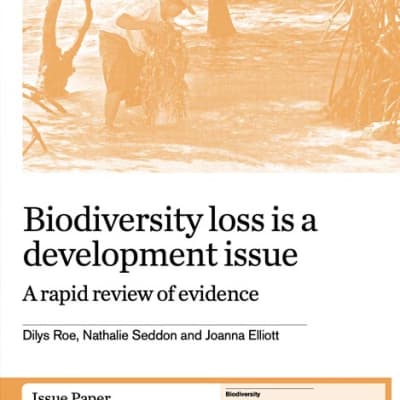
Biodiversity loss is a development issue
From genes to micro-organisms to top predators and even whole ecosystems, we depend on biodiversity for everything from clean air and water to medicines and secure food supplies. Yet human activities are destroying biodiversity around 1000 times faster than natural ‘background’ rates. -
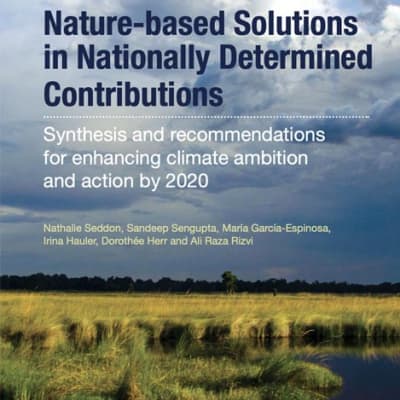
Nature-based Solutions in Nationally Determined Contributions
Synthesis and recommendations for enhancing climate ambition and action by 2020 -

Biodiversity loss is a development issue
“From genes to micro-organisms to top predators and even whole ecosystems, we depend on biodiversity for everything from clean air and water to medicines and secure food supplies. Yet human activities are destroying biodiversity around 1,000 times faster than natural ‘background’ rates. This global biodiversity crisis is hitting the poorest communities first and hardest because […] -
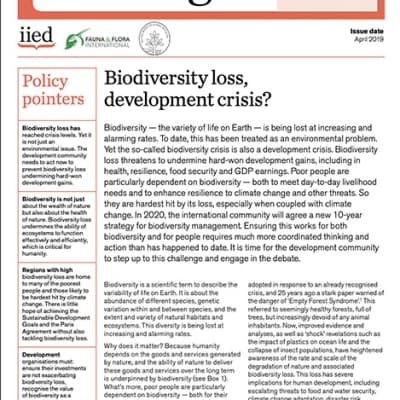
Biodiversity loss,development crisis?
Biodiversity loss has reached crisis levels. Yet it is not just an environmental issue. The development community needs to act now to prevent biodiversity loss undermining hard-won development gains. -
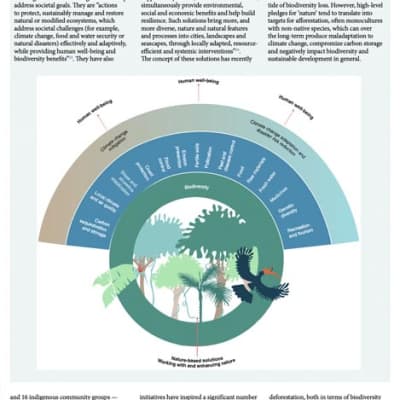
Grounding nature-based climate solutions in sound biodiversity science
The current narrow focus on aforestation in climate policy runs the risk of compromising long-term carbon storage, human adaptation and eforts to preserve biodiversity. An emphasis on diverse, intact natural ecosystems — as opposed to fast-growing tree plantations — will help nations to deliver Paris Agreement goals and much more. -

Grounding nature-based climate solutions in sound biodiversity science
We have a new paper out now in Nature Climate Change Summary The current narrow focus on afforestation in climate policy runs the risk of compromising long-term carbon storage, human adaptation and efforts to preserve biodiversity. An emphasis on diverse, intact natural ecosystems — as opposed to fast-growing tree plantations — will help nations to […] -
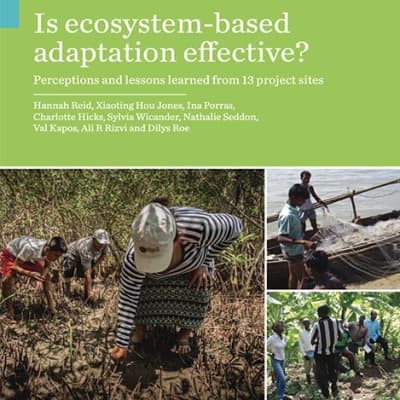
Is ecosystem-based adaptation effective? Perceptions and lessons learned from 13 project sites
Ecosystem-based adaptation (EbA) is an increasingly popular strategy for addressing the linked challenges of climate change and poverty in poor countries, where dependence on natural resources for lives and livelihoods is high. -
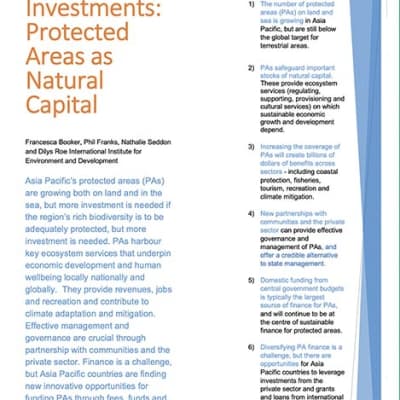
Wild Investments: Protected Areas as Natural Capital
Asia Pacific’s protected areas (PAs) are growing both on land and in the sea, but more investment is needed if the region’s rich biodiversity is to be adequately protected, but more investment is needed. -
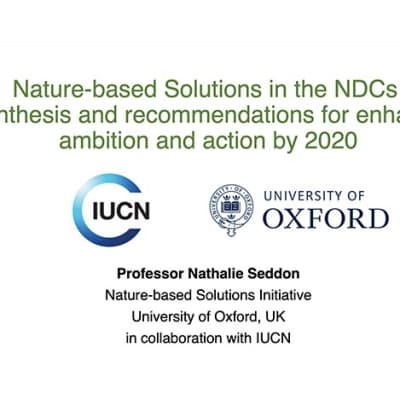
Nature-based Solutions in the NDCs: A synthesis and recommendations for enhancing ambition and action by 2020
An event slide show given by Prof. Nathalie Seddon -
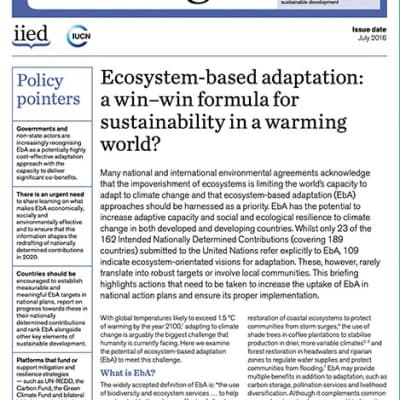
Ecosystem-based adaptation: a win–win formula for sustainability in a warming world?
Many national and international environmental agreements acknowledge that the impoverishment of ecosystems is limiting the world’s capacity to adapt to climate change and that ecosystem-based adaptation (EbA) approaches should be harnessed as a priority. -
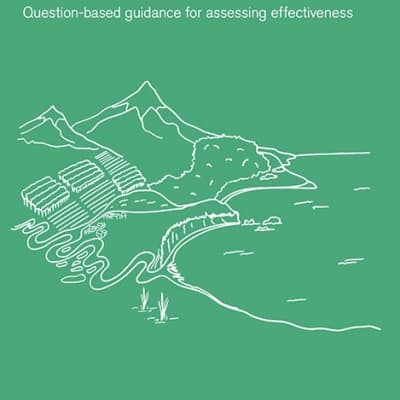
Ecosystem-based adaptation: question-based guidance for assessing effectiveness
This booklet sets out guidance for assessing the effectiveness of an ecosystem-based approach to climate change adaptation. It describes a process, based around asking a detailed set of questions, that can be used by project managers and researchers. -
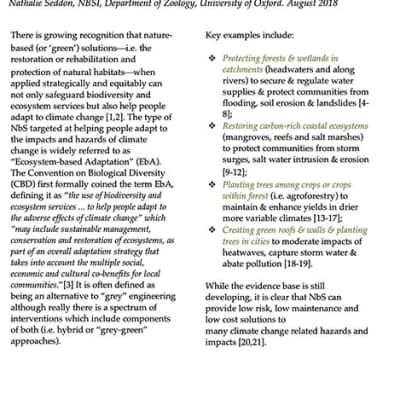
How effective are Nature-based Solutions to climate change adaptation
This breif discusses how nature-based solutions can help people adapt to the effects of change and disasters whilst slowing warming and protecting biodiversity, with many more positive consequences, fewer risks and lower costs than engineering-based approaches. -
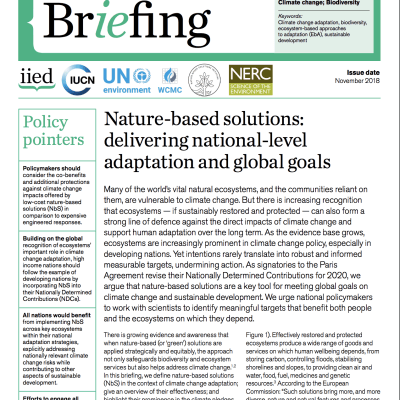
Nature-based solutions: delivering national-level adaptation and global goals
“Many of the world’s vital natural ecosystems, and the communities reliant on them, are vulnerable to climate change. But there is increasing recognition that ecosystems — if sustainably restored and protected — can also form a strong line of defence against the direct impacts of climate change and support human adaptation over the long term. […] -
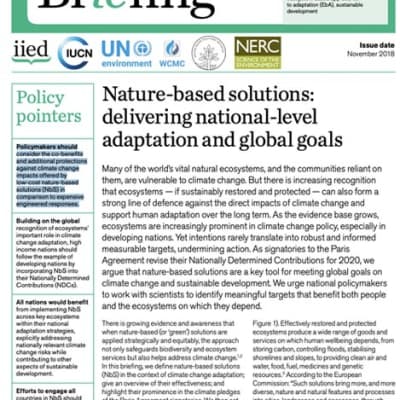
Nature-based solutions: delivering national-level adaptation and global goals
Policymakers should consider the co-benefits and additional protections against climate change impacts offered by low-cost nature-based solutions (NbS) in comparison to expensive engineered responses. -

A rallying cry for nature’s role in tackling climate change
China and New Zealand called on leaders in government and business to endorse nature-based solutions. The Nature-based Solutions for Climate Manifesto aims to attract political momentum, highlight the need for funding, and encourage the integration of nature in all aspects of planning and decision making for sustainable development. -

Jen M. Lucey
About Jennifer Lucey is the Deputy Director of the Nature-based Solutions Initiative and a Senior Researcher specializing in biodiversity and sustainable agriculture at the Smith School for Enterprise and the Environment (Department of Geography) at the University of Oxford. Her impact-driven research aims to find and refine nature-based solutions for transforming agricultural landscapes to support […] -

Sustain-Cocoa: Sustainable sourcing policies for biodiversity protection, climate mitigation, and improved livelihoods in the cocoa sector
The conversion and degradation of tropical forests have multiple negative socio- environmental impacts. Conversely, their restoration, including enhancing tree cover on already cleared farmland, is a powerful nature-based solution to climate mitigation and adaptation, with potentially large biodiversity and rural livelihood co-benefits. A major driver of forest loss and degradation in the tropics is the […] -

Nature-based solutions for resilient infrastructure systems in Jamaica, Bangladesh and the Maldives
This project investigates the benefits and costs of NbS in enhancing the resilience of infrastructure systems, including water supplies, renewable energy, transport systems and flood protection. It uses geospatial tools to inform the prioritization of NbS and their deployment where they will yield the greatest benefits for infrastructure resilience, biodiversity, livelihoods and carbon sequestration. -

Cécile A.J. Girardin
Interests and expertise My research focuses on the potential for Nature-based Solutions to respond to climate change. I am an expert on the ecosystem functioning and carbon dynamics of tropical forests across the globe, and their response to a rapidly changing climate. I am a scientist and an artist. As an artist, I have produced […] -

Adam Blanchflower
Interests and expertise I am a fourth-year Biology (MBiol) student at the University of Oxford, completing my Master’s research under the supervision of Dr Daniel Hending. My project focuses on assessing how forest fragmentation affects nocturnal lemur populations in Sahamalaza-Iles Radama National Park, Madagascar, using passive acoustic monitoring (PAM). This approach offers a novel way […] -

Understanding the value and limits of NbS to address climate change and other development challenges in the Philippines
This research provides a country-specific analysis of nature-based solutions (NbS) for addressing societal challenges in the Global South, with a focus on the Philippines. This project examines the potential of NbS to support climate change adaptation, identifying intervention types, outcomes, priorities, and the factors that hinder or enable NbS. A central question guides this work: […] -

Caleb Samrai
Interests and expertise I am a fourth-year student studying Biology (MBiol) at the University of Oxford, under the supervision of Professor Nathalie Seddon and Dr William Thompson for my Master’s research. My project is an investigation into the environmental and economic trade-offs of coffee agroforestry in Vietnam’s Central Highlands, where I will be working with […] -

Conserving sharks and rays in the global south
This project assesses the vulnerability of shark species and sustainability of elasmobranch fishery against contemporary fishing pressures. This information is being integrated into the National Plan of Action for Sharks and rays-Bangladesh as part of the Food and Agriculture Organization’s International Plan of Action for Conservation and Management of Sharks. The research explores the ecological, […] -

Kathryn Brown

